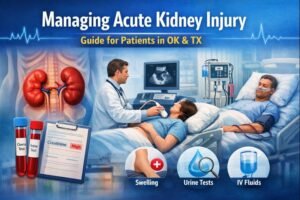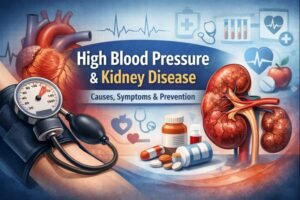Chronic kidney disease often starts quietly. There are no sirens, no flashing lights—just a gradual decline in how the kidneys do their job. These vital organs filter waste, balance fluids, and support healthy blood pressure. When they start to slip, the effects can touch every part of the body. We believe the best defense begins with awareness. Understanding the basics of kidney function can be the first step in protecting long-term health. That is why early conversations around prevention matter so much.
Why Early Detection Of Chronic Kidney Disease Matters
Catching chronic kidney disease in its early stages is the best shot at protecting long-term kidney function. Many people do not realize there is a problem until the damage has advanced. By then, treatment options narrow, and managing symptoms becomes more difficult. Early detection changes that. It allows us to slow progression, avoid complications, and preserve quality of life. Simple lab tests and regular checkups can uncover early signs long before symptoms appear. In kidney care, time is everything—and acting early often means living better, and longer.
Key Early Signs to Watch For
Chronic kidney disease does not always make a dramatic entrance. Many early symptoms get brushed off as something else. That is why knowing what to look for matters. Fatigue that lingers, swelling in the legs or ankles and changes in urination patterns may signal early kidney damage. Some people notice dry, itchy skin or muscle cramps that seem to come out of nowhere. High blood pressure that is hard to manage can also be a red flag. If you notice a combination of these signs, it is time to act. We recommend routine lab tests to stay on top of your kidney health—even if you feel fine.
How to Reduce Your Risk And Stay Ahead
Taking control of your health can make a real difference in how chronic kidney disease progresses—or whether it begins at all. Start with your diet. A balanced intake of fresh vegetables, lean proteins, and low-sodium foods helps reduce strain on the kidneys. Stay hydrated, but avoid overloading fluids if you have been advised otherwise. Regular exercise supports both kidney function and heart health. If you have diabetes or high blood pressure, managing those conditions is critical. Even small, consistent changes add up. We encourage regular screenings, especially if you have a family history of kidney disease or other risk factors. Staying ahead starts with staying informed.
Why Lifestyle Choices Matter for Kidney Health
When it comes to chronic kidney disease, lifestyle is not just a detail—it is the foundation. What we eat, how we move, how much we sleep, and the stress we carry all play into our kidney health. Smoking, for instance, narrows blood vessels and reduces blood flow to the kidneys. Excessive alcohol can also interfere with normal kidney function. On the flip side, getting enough rest, staying physically active, and choosing fresh, whole foods offer powerful protection. Healthy habits do not have to be perfect—they just have to be consistent. The kidneys respond well to small, positive changes made over time.
A Proactive Approach to Kidney Care
Being proactive means doing more than reacting to symptoms. It means building a routine that supports strong, steady kidney function for the long haul. We encourage patients to schedule regular check-ins, especially if they are managing conditions like diabetes or hypertension. Talk with a healthcare provider about your personal risk factors. Know your numbers—blood pressure, glucose levels, and kidney function tests matter. If you are already showing early signs of chronic kidney disease, we can help guide your next steps. Prevention is not a one-time action. It is a mindset, and it begins with education and consistency.
Stay Vigilant, Stay Healthy
Chronic kidney disease may develop quietly, but staying alert can make all the difference. Pay attention to the signs, take steps to reduce your risk, and make wellness a daily habit. We are here to support you through every stage of your kidney journey. Whether you need guidance, screening, or full care management, Southern Oklahoma Kidney Center is ready to help. Let us work together to protect your health—starting today.




